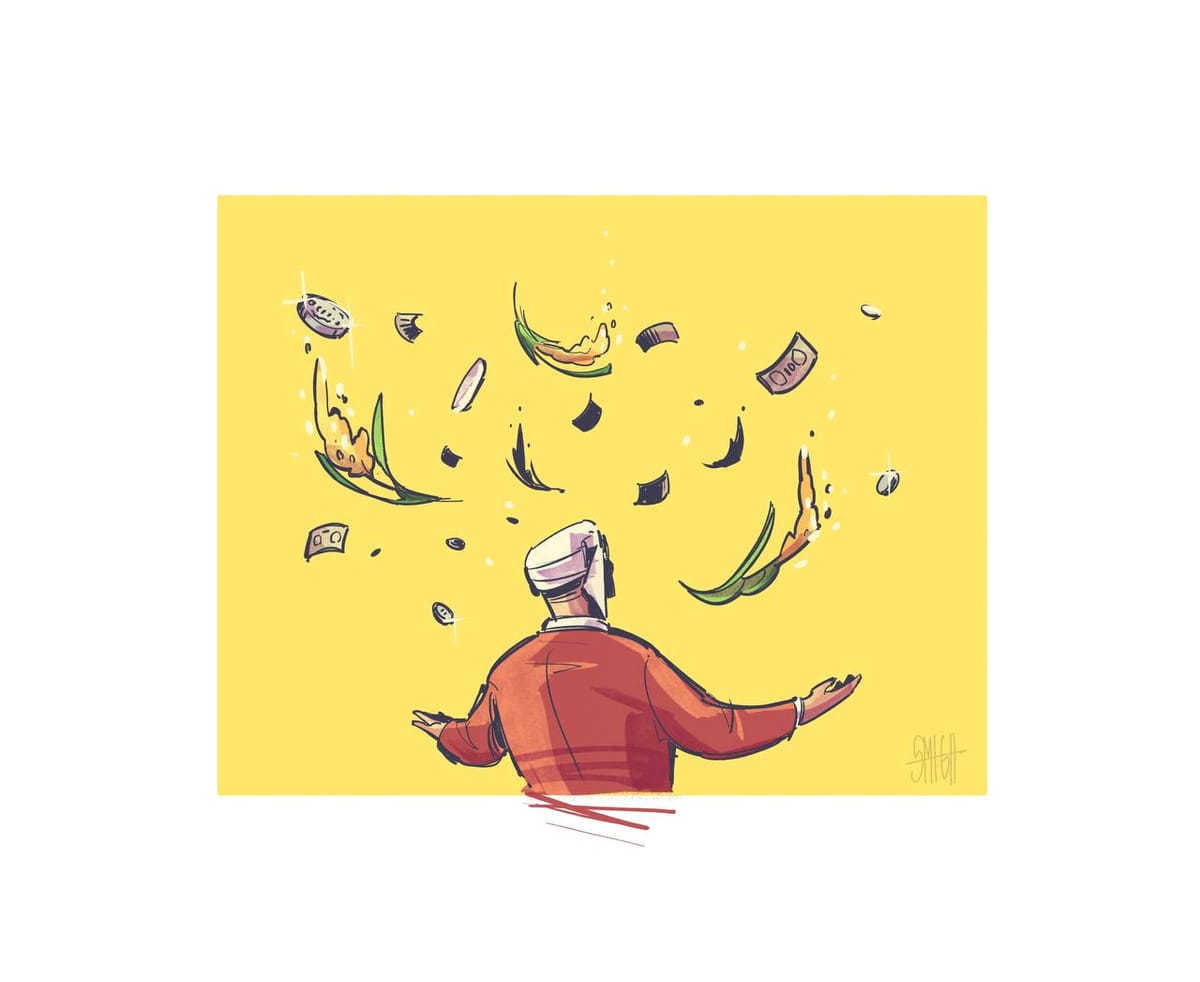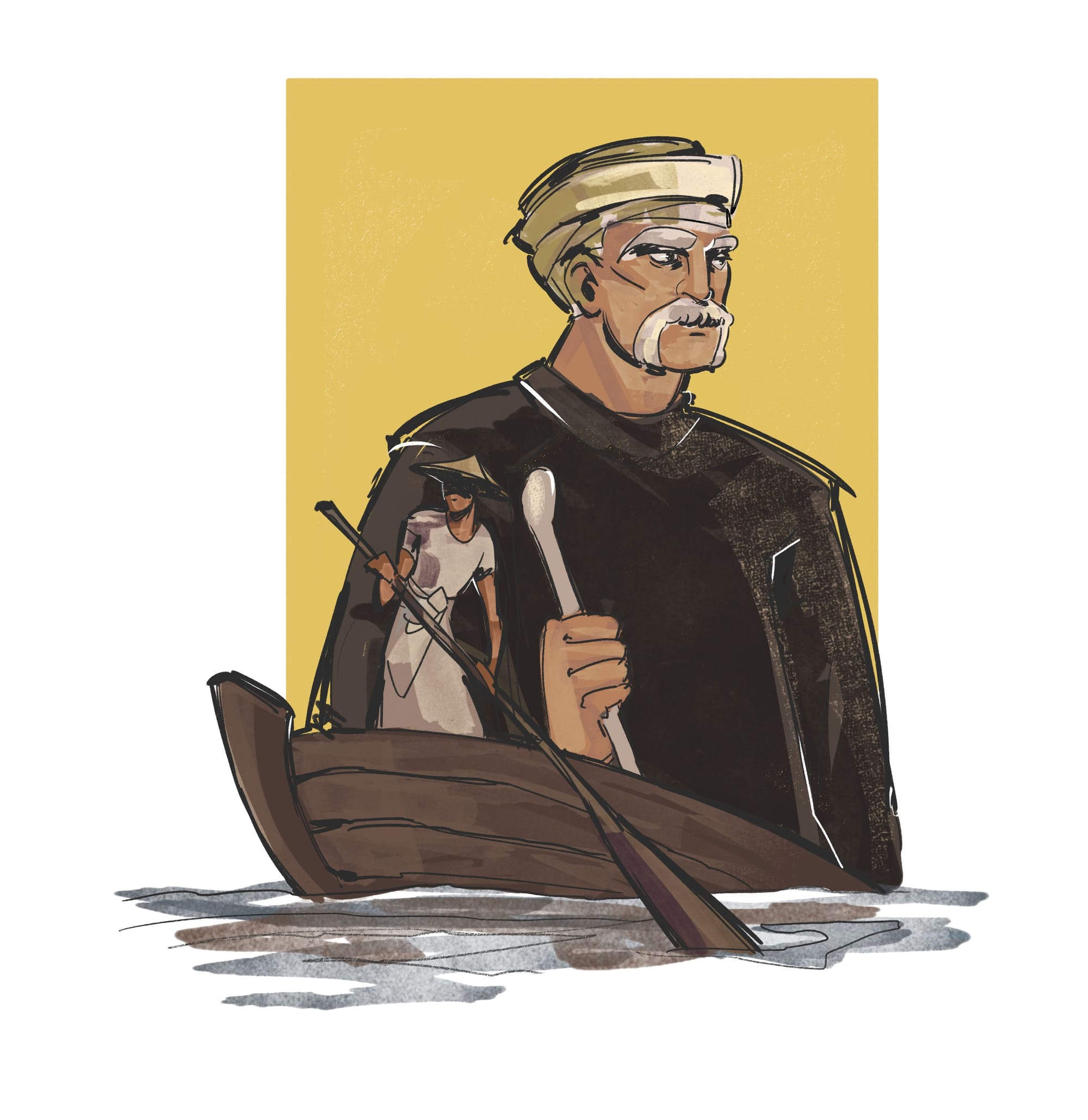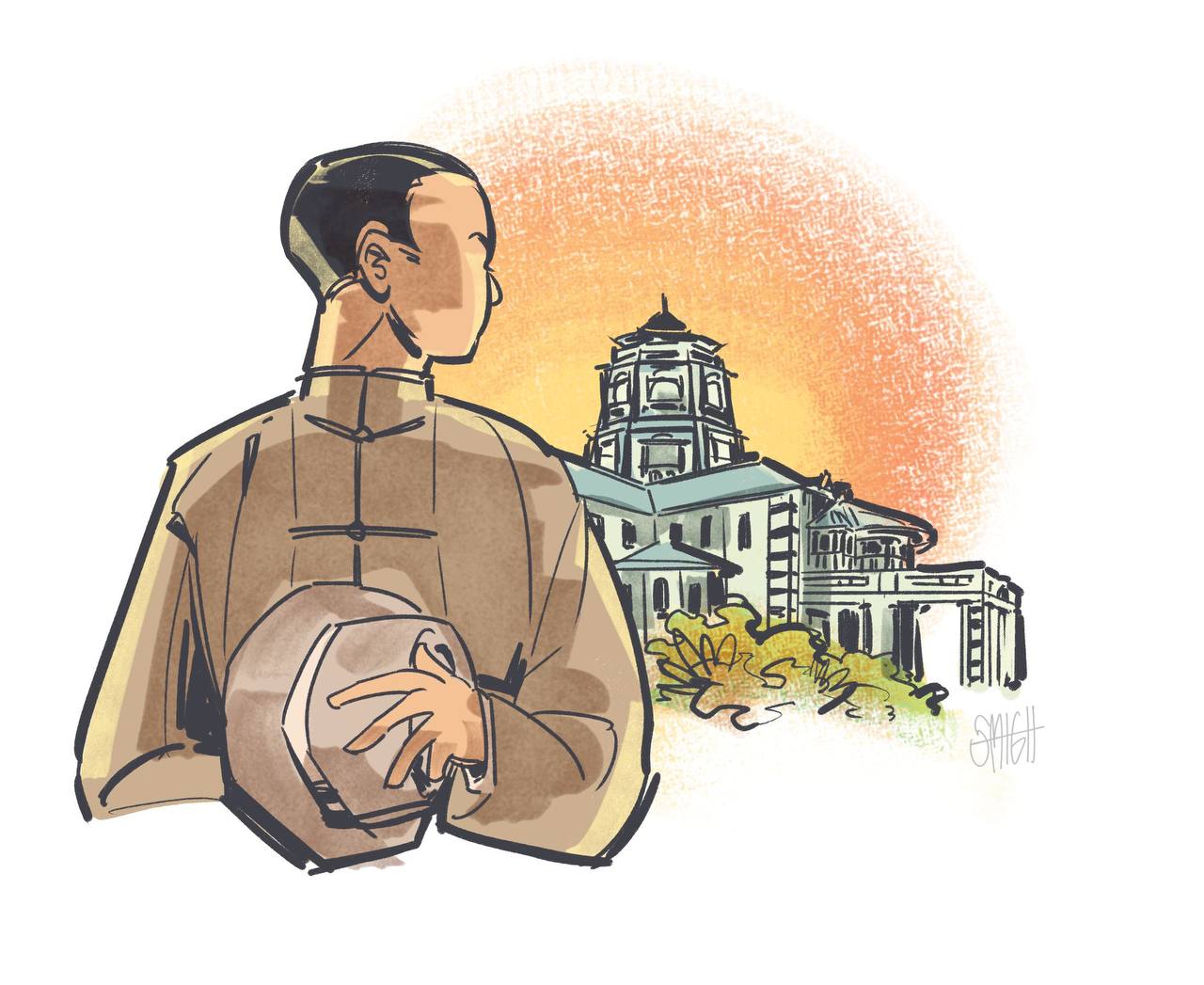
Have you heard of the pagoda in Myanmar that keeps its relic chamber open? Most pagodas across Myanmar typically keep their relic chambers sealed. However, the Botahtaung Pagoda in Yangon is unique as its relic chamber remains open, allowing the public to easily pay their respects. It's intriguing to consider whose idea this was.
Today, if you enter Min Ye Kyaw Swa Street in Latha Township from Pyay Road in Yangon, after walking for about 2 minutes, you'll find the "Union of Myanmar Federation of Chambers of Commerce and Industry - UMFCCI" on your right. This organization is currently the largest private sector association in Myanmar, wielding significant influence even in government policy-making. But who founded its predecessor, the Burma Chamber of Commerce?
In downtown Yangon, at the corner of Bogyoke Aung San Road and 35th Street, there's the famous Thwin Cinema. In fact, this cinema holds a significant place in Myanmar's cinematic history. To be precise, it was the first cinema owned by a Myanmar national in the country. But why was it named "Thwin" instead of something else?
All these stories point to one person: Sir U Thwin, a prominent Burmese merchant during the British colonial period. When we say "Sir U Thwin," it means U Thwin who received the title of "Sir" from the British government. While some other Myanmar nationals also received the Sir title during the British period, U Thwin's case was unique. Let's look at his remarkable life from the beginning.
Early Life of Sir U Thwin
Sir U Thwin was born in Mawlamyine in 1878. He came from a wealthy merchant family. In 1901, he passed his FA examination from Rangoon College. At that time, the University of Yangon hadn't even been established yet - it was about 20 years before its founding.
U Thwin continued to study for his BA but returned to Mawlamyine after four months, deciding not to continue his education. Neither his parents nor U Thwin himself wanted him to become a government servant. However, being young, he worked briefly as an education officer for about a year to gain experience. During this time, he married Daw Daw Thein, the sister of U Boe Pyaut, who later became a prominent industrialist and trustee of Shwedagon Pagoda.
After marriage, U Thwin settled in Yangon. Coming from a merchant family and having a passion for trading, he engaged in rice trading in Yangon. He established a rice mill in Khanaung To, across the river from Yangon. During that era, the rice business was dominated by British merchants.
In one instance, U Thwin waited a day hoping for rice prices to rise. However, the price crashed instead, resulting in a massive loss of 75,000 kyats. For U Thwin, who had come to Yangon with dreams of becoming a millionaire, this was a devastating setback. To understand the magnitude of this loss, consider that at the time, 100 baskets of paddy cost between 130-160 kyats.
When his parents learned of this, they called him back to Mawlamyine, but the determined U Thwin borrowed 50,000 kyats from them and continued his business endeavors.
Becoming the Rice Wizard
After about three years in the rice industry, U Thwin realized how unpredictable rice prices could be. This explained his earlier massive loss of 75,000 kyats when he was still inexperienced.
He gradually worked to understand rice prices better, eventually becoming more accurate at predicting price fluctuations than others. Myanmar traders began following U Thwin's price predictions.

Where Opportunities Bloom
A place where creativity, learning, and connection come together. The Build Myanmar Community Center is the ultimate solution for youth seeking inspiration and opportunity.
This innovative center offers:
- Fully-equipped spaces with high-speed internet
- Flexible co-working areas for collaboration
- Networking opportunities
- Diverse workshops led by experts from various fields
- A comprehensive library for knowledge seekers
- Maker spaces to fuel creativity and innovation
Interested in transforming your potential? Explore the link below and discover a world of possibilities.
Once, he won a betting contest against Mahmud, a prominent rice broker on Mogul Street, by precisely predicting rice prices. Another broker, G.A. Surman, would visit U Thwin three times a day to inquire about his calculations.
Thus, U Thwin became the unrivaled rice price predictor in the market. When he traveled to Penang Island and Singapore in 1939, local newspapers celebrated his arrival with headlines proclaiming "The Rice Wizard from Burma has arrived."
Burma Chamber of Commerce and UMFCCI
U Thwin grew up during the British colonial period, when Myanmar's rice trade was controlled by the British and merchants from Mogul Street. In rice trading, they only used British, Indian, Chinese, and Persian brokers, excluding Myanmar brokers. These brokers had their own association where Myanmar people weren't allowed to join. Their associations received market information first, giving them a significant advantage over Myanmar traders.
Unable to accept this situation, U Thwin, along with other prominent Myanmar citizens, established the Burma Chamber of Commerce in 1911. They appointed MA U Aung Khaing as the chairman.
This organization evolved through different eras and is now known as the Union of Myanmar Federation of Chambers of Commerce and Industry - UMFCCI. The organization has numerous affiliated associations and works with the government to develop the private sector. It also acts as an intermediary, conveying the voices of member businesses to the government in economic policy-making.
Thuriya Newspaper Administrative Board
Around 1911, the Thuriya newspaper emerged in Myanmar. It was co-founded by Ba Gyan Ba Bay and others who were prominent in Myanmar politics.
When establishing the newspaper, U Thwin recognized that as it served Myanmar's interests, it needed to be financially sustainable for long-term operations. Therefore, he established and chaired the administrative board of the Thuriya Newspaper Company Limited to support the newspaper.
Later, Thuriya newspaper became an essential reference in discussions about Myanmar political newspapers and independence movement publications.
Seeing British, Buddhist-Style Greetings, Shoe Removal Custom, and the Harmony Association
After the British completely annexed Myanmar in late 1885, while they destroyed many aspects of Myanmar culture and customs, they retained those customs that suited them.
Myanmar people traditionally had to give Buddhist-style greetings and remove their shoes when seeing their Myanmar king and court officials. The British didn't abolish this custom, requiring Myanmar people to greet them similarly and remove their shoes when speaking with them. U Thwin, being a Mon person with proud historical traditions and a devout Buddhist, disliked showing such reverence to the British, who were neither his rulers nor his people.
Therefore, he established the Harmony Association to combat these traditions.
For the association's sustainability and success of its initiatives, U Thwin, being a merchant, considered the financial aspects. He hired U Phoe Sein's theater troupe to perform at Jubilee Hall. Although U Phoe Sein's troupe was very famous at the time, ticket prices were typically only 8 pyas (16 pyas = 1 kyat). When performing for the Harmony Association, U Thwin set the ticket price at 5 kyats. Despite U Phoe Sein's concerns about attendance at such a high price, U Thwin took responsibility.
Thanks to U Thwin's promotion, U Phoe Sein's performance was so well-attended that about 600 people had to be turned away on the first night due to full capacity. This generated substantial funds for the association.
With these funds, they printed pamphlets stating that Myanmar people didn't need to give Buddhist-style greetings, remove shoes, or bow to the British - they should show respect according to British customs instead.
This demonstrated U Thwin's diplomacy. He wasn't showing disrespect to the British but rather arguing that Myanmar traditional forms of respect should be reserved for their own rulers and kings, while British customs should be used to show respect to the British. This approach satisfied both sides. Due to the Harmony Association's activities, the custom of giving Buddhist-style greetings and removing shoes when seeing British officials eventually disappeared.
Moulmein Association
Although U Thwin was established in Yangon and well-known in Yangon's administrative circles, he wasn't originally from Yangon. He was a Mon person born in Mawlamyine, where his parents still lived.
By 1918, about 40,000 people from Mawlamyine had moved to Yangon. U Thwin recognized that these people, who had come to Yangon seeking better opportunities, needed help with housing difficulties, employment challenges, and networking issues.
Therefore, he established the Moulmein Association on Sule Pagoda Road in Yangon.
He purchased the association's office building with his own money and looked after the welfare of Mawlamyine natives. U Thwin established the Moulmein Association in Yangon in 1918, quite early on, and later many similar associations emerged in Yangon following his model.
Thwin Cinema
Myanmar cinema began emerging around 1920, followed by the establishment of foreign-owned movie theaters. Seventeen years later, the first Myanmar-owned cinema appeared at the corner of Bogyoke Aung San Road and 35th Street in Yangon. This was the Thwin Cinema. The cinema was established by U Nyunt of British Burma and was the first movie theater owned by a Myanmar national during the British colonial period.
U Nyunt had borrowed money from Sir U Thwin to purchase the location and build the cinema.
After completing the cinema, he named it "Thwin Cinema" after U Thwin. Around 1949-1950, the loan was fully repaid. However, U Nyunt kept the name "Thwin Cinema" out of respect for Sir U Thwin, who had helped him when he needed it. This cinema still exists today.
Why U Thwin Received the Sir Title
On January 1, 1941, during the New Year's honors ceremony, U Thwin, who was both an Upper House member and a trustee of Shwedagon Pagoda, was awarded the title of Sir by the British government.
Regarding this honor, the January 12, 1941 Sunday edition of the Dedoke newspaper summarized: "U Thwin was respected and trusted not only by the public but also by monks; he fought against the custom of giving Buddhist-style greetings and removing shoes before the British with national pride; he mediated multiple times between leaders on the issue of separating or combining Burma with India; he also mediated the unresolved 1938 Myanmar-Muslim riots; he personally intervened to resolve the student protest at the Secretariat... The conferment of the Sir title to U Thwin, who possessed such qualities, was due to appreciation of his actions."
In essence, while many received Sir titles during the British period for serving British interests, U Thwin was unique - even monks who generally opposed the British respected him, and as the Dedoke journal reported, he was honored for his achievements.
U Thwin and Religious Affairs
When the Dedoke journal wrote that U Thwin was a Mon person from Mawlamyine who upheld Buddhism, one might wonder how he did so.
Today's Tipitaka examinations are the most prestigious and grand examinations in Buddhism. They are so challenging that monks must memorize over 8,000 pages and thoroughly understand the concepts. Sir U Thwin collaborated with Prime Minister U Nu to conceive these grand examinations. He formed the Buddhist Support Organization and served as its chairman to establish these examinations.
When monks who had mastered all three Pitakas emerged from these examinations, U Thwin worked with Prime Minister U Nu to organize the Sixth Buddhist Council. This led to the purification of the three baskets of Buddhist teachings: Sutta, Vinaya, and Abhidhamma.
Moreover, the first monk to pass all three Pitakas, Mingun Sayadaw U Vicittasarabhivamsa, and Mahasi Sayadaw were both close disciples of Sir U Thwin.
Today's Mahasi Meditation Center on Hermitage Road in Yangon is built on 5 acres of land donated by Sir U Thwin, and its Phalyaung Dhamma Hall is named after U Thwin's parents, U Phal and Daw Yaung.
Opening the Botahtaung Pagoda Relic Chamber
U Thwin was also someone who dared to implement what he believed was right and fair. During the reconstruction of Botahtaung Pagoda, U Thwin was appointed chairman of the reconstruction committee due to his prominence in the city and his integrity.
During the reconstruction, there was disagreement about whether to keep the relic chamber open or closed. U Thwin believed it should remain open for public veneration. Those who wanted it closed argued that seeing valuable relics might inspire greed and create bad karma, and traditionally, relic chambers were kept sealed.
U Thwin challenged those who wanted it closed to raise the necessary 1.2 million kyats for the pagoda's reconstruction, at which point they backed down. U Thwin kept the relic chamber open and successfully raised the required 1.2 million kyats.
This is why people can still pay their respects at the Botahtaung Pagoda's relic chamber today.
U Thwin served in various roles in politics, business, and religious affairs during his time. For example, he served as a member of the Legislative Council during the British period (1937-1941).
Consequently, not only did the British government award him the Sir title in 1941, but after independence, the Myanmar government honored him with the Thiri Thudhamma title in 1950. He also received the Order of the Crown from the King of Thailand.
Sir U Thwin, who served his country, his people, and his community from various positions, passed away in 1966 at the age of 88. Though he is gone, his reputation lives on, and his contributions remain visible landmarks in Yangon to this day.
By Han Thit Eain (Y3A)
Read More:
 Build Myanmar - MediaY3A
Build Myanmar - MediaY3A
 Build Myanmar - MediaY3A
Build Myanmar - MediaY3A
Build Myanmar-Media : Insights | Empowering Myanmar Youth, Culture, and Innovation
Build Myanmar-Media Insights brings you in-depth articles that cover the intersection of Myanmar’s rich culture, youth empowerment, and the latest developments in technology and business.
Sign up for Build Myanmar - Media
Myanmar's leading Media Brand focusing on rebuilding Myanmar. We cover emerging tech, youth development and market insights.
No spam. Unsubscribe anytime.
Sign up now to get the latest insights directly to your mailbox from the Myanmar's No.1 Tech and Business media source.
📅 New content every week, featuring stories that connect Myanmar’s heritage with its future.
📰 Explore more:
- Website: https://www.buildmyanmarmedia.com/
- Facebook: https://www.facebook.com/buildmyanmar
- YouTube: https://youtube.com/@buildmyanmarmedia
- Telegram: https://t.me/+6_0G6CLwrwMwZTIx
- Inquiry: info@buildmyanmar.org
#BuildMyanmarNews #DailyNewsMyanmar #MyanmarUpdates #MyanmarNews #BuildMyanmarMedia #Myanmarliterature #myanmararticle #Updates #Insights #Media
